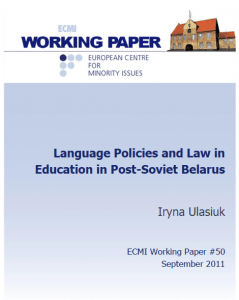
Language Policies and Law in Education in Post-Soviet Belarus
The dissolution of the Soviet Union brought to the fore claims of linguistic minorities which had been ignored far too long. In almost all of the former Soviet republics language became an impetus to national revival and an important instrument in consolidating the newly independent states. At times excessively accentuated and overly politicized, the language issue demanded immediate reaction. It was not, therefore, surprising, that almost all of the former Soviet republics rejected to various degrees the legal dogmas which had been created in the Soviet Union and moved towards the weakening of the bonds within the former USSR, the lowering of the status of the Russian language as a symbol of long-term oppression and, as a consequence, the strengthening of the position of the titular language. Belarus has somewhat stood aloof in the process. With Russian being the de facto main language, and Belarusian playing largely a symbolic function, the position of other languages spoken by minority groups residing within the territory of Belarus seems indeed precarious. The present paper seeks to identify the main tendencies in the development of language legislation in the area of education, which has traditionally been considered as determinant for the survival of the language, in Belarus. It investigates the place of the Belarusian legislation in the field of education reserved for the language rights of the titular nation and those of national minorities.
Colophon
Author: Iryna Ulasiuk
Publisher / organisation: European Centre for Minority Issues
Date of publication: 09/01/2011
Total number of pages: 14
Language: english
Link: Publication URL
Type: Report / Study
Countries: Belarus
Download PDF:
Themes
Education, Human Rights, Minority Rights


